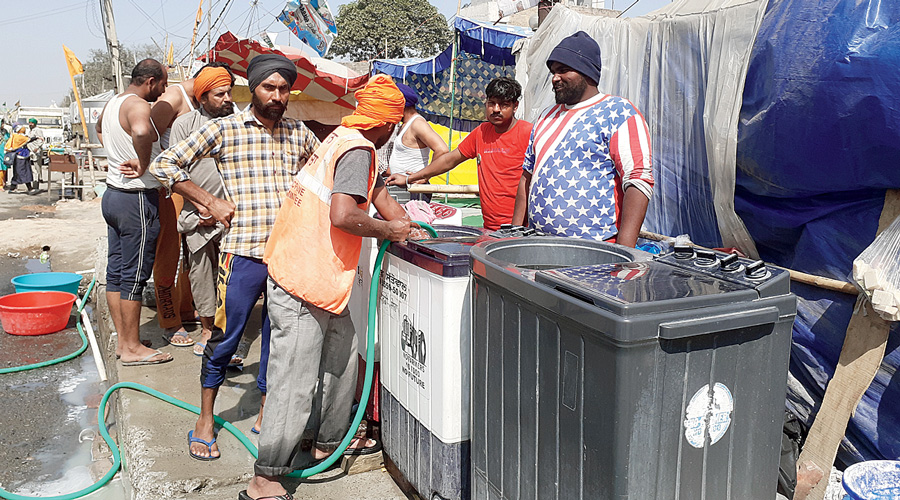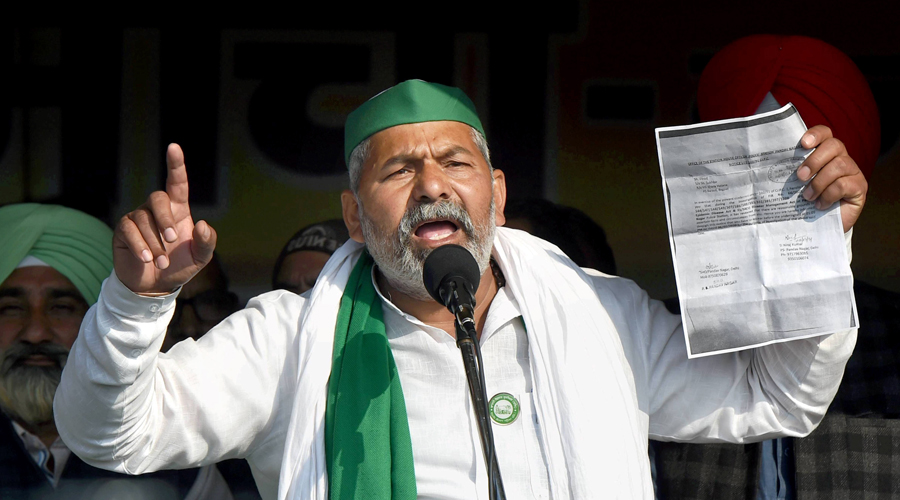The hair on the arms of Sonu Singh and Lucky Singh — friends from Punjab’s Nawanshahr who run a laundromat at the Singhu protest site of farmers — has turned blonde and their skin has begun to peel off because of constant exposure to soap water.
The work hazard does not seem to bother Sonu and Lucky, who have rallied behind the protesters against the new farm laws. They are grateful for the electricity and water given to them by a resident of Haryana’s Kundli village who does not want to be named for fear of harassment by authorities of the BJP-ruled state.
Although the protest site is better known as Singhu, the name of a village in Delhi (the highway to which is barricaded), it falls almost entirely in Kundli in Haryana’s Sonipat district.
Sonu told The Telegraph: “We were plumbers. We don’t have farms, but we have the spirit. When the protest started, we brought two machines from our homes. The organisers of the protest donated two more, and people donate detergent. Around 25kg of detergent is used every day and as the load is high, we constantly have to assist the machine with our hands.”
He added: “A person who has stood with us from the beginning is the Haryanvi brother who gives the electricity and water. He has asked us to even use his bathroom and sleep in his house if we need to. His business has been down since we came here, yet he is bearing this expense.”
Harmandeep Singh and other protesters from Ludhiana’s Lalton village have set up a small shed with a wood-heated boiler, and a toilet and bathroom connected to an underground sewer, right in front of a glass godown. This stretch of National Highway 44 is dotted with godowns and factories.
“The owner of the godown is most helpful. The electricity is from him. Whenever he needs to bring in goods, I reverse our car parked in front and we make space for his vehicles to come in…. There is economic hardship for all of us but when it comes to your conscience, money doesn’t matter,” Harmandeep said.
The movement of any large vehicle on this stretch of almost 8km is impossible with most of the highway taken up by tractor trolleys. As a result, industrial production in several units has fallen, as have jobs.
Cooperation from residents in the neighbourhood is key to the survival of this unprecedented and prolonged blockade of one of India’s busiest highways.
The protesters are withstanding the elements, the risk of disease from poor sanitation and sewage facilities, and the uncertainty of a struggle without an end in sight. The residents face an economic crisis with their highway of prosperity rendered unusable for the past three months.
Kake, who prefers to be identified only by the term of endearment that Kundli residents use, had a thriving wholesale shop of disposable cups, plates and related items off NH44. The entrances to the row of shops have now been barricaded by Delhi police, and Kake makes a living selling tea in a bylane beside his shop.
“Modi has made me a chaiwallah (which the Prime Minister says he once was). Yet, whenever I have questioned farmers over the prolonged protest that has snatched my livelihood, they call me a Modi-wallah,” Kake told this newspaper.
A resident of Narela in Delhi nearby, Kake said that free langar meals were good for day labourers who had lost their jobs but for businessmen like him each day of work away from his trade was pulling him deeper into debt.
“It is hard for any person with self-respect to eat free food every day. The farmers are generous and friendly, but I want to earn my living. When we talk to local politicians or the police, they keep saying that this will end in two days. I don’t know whom to expect any solution from any time soon as the government won’t withdraw its laws, the farmers their protest and the police their barricades,” Kake said.
Dharmendar earns daily wages and also drives an electric autorickshaw, the most popular mode of transport to reach the protest site after the elaborate barricading of the highway.
He said: “Most of my rides are people going to the protest, and locals don’t travel to that side now as the shops and malls are shut because of the blockade. Jobs are fewer now as raw material can’t come into factories on the protest stretch.”
The Rai Assembly constituency office of the Indian National Lok Dal has been transformed into a place to rest for protesters.
The party’s leader, Ashok Kaushik, told this newspaper that despite problems, the general will of the local population is to support the farmers.
“People can’t go out as the road is jammed. Some 1 lakh people used this highway for their daily commute. The route is now longer and through smaller roads. There is discomfort, but there is an overwhelming sense of solidarity with these people because their cause is right, and we are all basically farmers. They have the capacity to make this struggle succeed and we have the capacity to support them,” Kaushik said.
Kake, Kaushik and Dharmendar are unanimous that no resident had thrown stones at farmers on January 30, when the protest site was attacked by what sections of the administration and the media had described as “locals angry with the insult to the national flag by farmers on Republic Day”.
While the police had described them as “local villagers”, Delhi’s ruling Aam Aadmi Party had identified three of them as BJP activists from other parts of Delhi.
“What I like about these protesters is they are polite. That’s how they have maintained good relations with us locals,” Dharmendar said.


